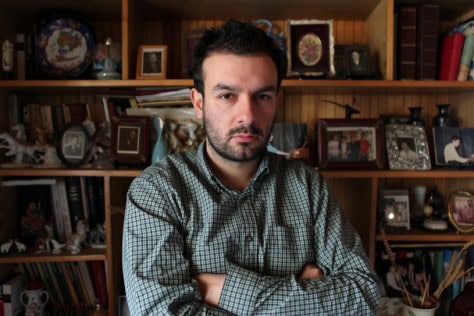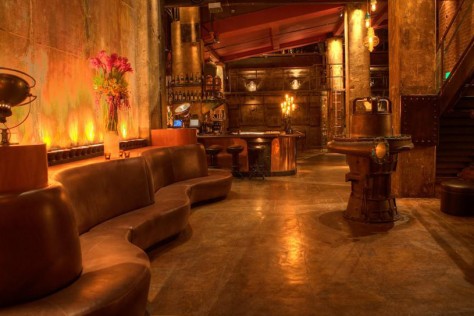Love them or loathe them, David Gordon Green’s films are undeniably special and possess a meditative beauty. His debut, George Washington, was made with a crew of friends, not much film, even less money and a cast of non-actors he found around North Carolina where the film was shot. Instead of leveraging the attention that came from George Washington to step into Hollywood, he followed it up with the equally finespun All the Real Girls. And after that he gave the Gordon Green treatment to the thriller genre with Undertow. Set to be released later this year, his new film, Snow Angels ventures north from the southern environments that were so integral to his earlier work. Adapted from the Stewart O’Nan novel, it’s a blunt drama that stars Sam Rockwell and Kate Beckinsale in a story of a broken marriage.
On all his films, Green surrounds himself with a collaborative crew made up of classmates from the North Carolina School of the Arts, including cinematographer Tim Orr. Working closely with a steady group of friends, he often keeps specific settings and dates vague in order to give the films a timeless quality. There is strength in the delicacy of both his characters and the dilapidating worlds that surround them. Whether it’s the opening scene of All the Real Girls capturing the beginning of a relationship, or the opening of George Washington marking the end of one, Green’s strongest asset is the ability to create certain moments that can stay with you forever.
But don’t even think about typecasting David Gordon Green. Anthem talked to the director a week into shooting his newest project Pineapple Express, a suburban drug-dealing action-comedy he describes as “unconventional, because none of it makes any sense. It’s just absurd. The whole movie’s just outrageous. I don’t even know what to compare it to.”
You were into film from a young age, and of course you went to film school. Outside of the movies, what would you say inspires your work?
Movies aren’t that inspirational. I feel that the movies are more of an influence and less of an inspiration. I think relationships are the inspiration, and traveling. I don’t know that [L.A.] is a great example, but I do a lot of sitting around in other places and watching people. I like taking the bus; that’s inspirational. New Orleans is a cool bus-town. Streetcars, buses, bikes…I enjoy that.
That crosses over into your work in a way; you often use local, non-professional actors in your films, right?
They’re all different. I do local casting as much as I can, except when I’m [in L.A.]. I wish I could locally cast somewhere else and bring them here because there’re so many actors here—it’s just boring people. People who come and memorize their lines and stand there…they’re all good-looking and it’s annoying. They all speak perfectly and they’re all trained. I would rather have people who have a raw sense of confidence in their own craziness and their own personal character. At least for all the background and the bit parts, you just kind of wish it wasn’t quite so sculpted.
You initially started to adapt Snow Angels for another director. Did that make you take a different approach, since you were expecting to hand over the screenplay?
For that movie, that’s the only way it worked because it was so intense. If I would’ve known I was going to direct it, I would’ve been scared of it and I would’ve written it more at an emotional distance. Knowing I was writing it for someone else, I had to be more expository. I was trying to emote myself on a page, rather than on film. You write more specific stage directions and more specific things for the actors to latch on to. Writing it with that sense of I’m going have to let it go was ultimately what made it readable. When I write for myself I almost lack emotion. I strip it all down.
But also, given your background as a director, you can’t help but visualize how you’d see it. To get immersed in a story then have to give it away—that seems hard.
Yeah, it gets weird. By the third draft I was just doing a job, you know? But [the original director] really pushed me in a great way to take it away from where I was familiar. In the book, for example, there’s a character that works in a junkyard. And I’ve been to junkyards before and I thought it would be interesting to see the character someplace a little bit less about him as a person. So I put him in a carpet factory, as a carpet salesman. We made a lot of shifts in the class structure [and] the economic lifestyle of the characters. Brought a little bit more of a middle class element in to it.
With the “lower class” there’s so much cliché already tied to it. Did you find that the middle class was more of a blank canvas?
It’s just the middle class is done so poorly, so often. I’m always drawn to poverty, because there’s such richness in characters and all the textures, production design and art direction. Everything about impoverished cultures from third-world countries to the ghettos of big American cities—I’ve always lived in them because I’m drawn to the colorful world and sensibilities of those environments.
But it’s a shortcut to making something cinematic too, because the production design is already there. You just turn a camera on something and it’s run down, rusted, beat up and you’re ready to go. With the mundane artlessness of most middle class Americans you have to dig deeper to find what’s interesting about them. Emotion and broad strokes of their characters have been suffocated so often that you have to peel those layers away to find where their injuries are or where their hopes are.
So you were pushed somewhere new?
The idea of someone interpreting [the script] and adopting that to their own personal sensibility—that was enough of a novelty. I’ve written a lot of things for other people—nothing’s been made. You don’t take a job like that unless you’re willing to make certain concessions to your ego. I write something and I think it’s great, and somebody tells me it’s not great, it’s just my ego that starts to get sad.
I guess I’m not that possessive, you know? People have stolen my ideas; I’ve stolen ideas from other people. As long as people are inspired by the result. Get out there and start making stuff and help push people into their own sense of initiative to get their own thing going. I spent a lot of this year producing a couple movies and watching people that I know and want to invest my time in take big steps with their careers. It makes me feel good [if] I can open a door for somebody, or be involved, or even just watch. Anytime there’s creative excitement in the air, even if it’s failure, if it’s ambitious and there’s initiative…
Awesome failures are the best—they’re almost more inspiring because they let you know it’s okay to fail.
Yeah! They’re great, because they go for it. If you don’t put yourself out there to some degree, what’s the point? I’m certainly no poster child for success, but I managed to make a living consistently being productive.
Why wouldn’t you say you’re a success?
I mean, in industry terms.
>strong>Well, your films don’t really strive for that kind of success—but you’ve consistently made good work.
Well, I’m making stuff that I’m excited about, and some people love it and some people hate it, and that’s the way it should be. If it didn’t have the extreme reactions, then I think it would probably be playing it too safe. Certain people have criticized my latest effort [Pineapple Express] as some sort of “Hollywood sell-out.” What greater risk could I possibly attempt right now than to do studio-action-comedy, a genre that I’ve only explored as a fan? I love not knowing; being excited about how it’s going but not knowing what the result is going to be.
For me, it’s just exciting that I’m not going to be able to sleep tonight, knowing that tomorrow we have this big shoot-out sequence. Many people are going to die on film. Blood’s going to be everywhere. Explosions.
I now know how that [genre] works. It’s a part of the process that I’ve always enjoyed watching and to have the privilege to be able to go in there and learn and explore and experiment with it myself is tremendously exciting. Especially coming off from [Snow Angels], a real drama. I’m drained. It’s the only way to detach myself emotionally. I want to go out and have a good time and this is the film to do that.
I think anytime there is a substantial emotion behind the camera, you can feel it. If it’s Apocalypse Now or Talladega Nights, all those movies have a brilliant madness behind them. It’s an enthusiasm.
Do you think that’s what gives your films such a unique feel? George Washington, especially—that’s like no other movie.
Well, the circumstances in which we made that were ideal. I came [to L.A.] after I graduated school and was so disheartened by what people were making, the movies I was seeing and the process of getting anything done. I thought: ‘I want to go just make a movie that was destined to fail, but I want to unapologetically make what I want to see as best I can for 42,000 dollars.’ I’m a very good businessman, myself. I’m very practical, realistic, always save my pennies, but I totally didn’t give a shit. I thought, I want to make this for myself and my friends that would like it. And if we’re totally dedicated to what we want to make, and don’t try preconceive any sort of audience reaction, critical reaction or marketing strategy…I don’t think I can ever make movies under those circumstances again.
I think once you’re exposed to success and failure there’s nothing you can do to deny your knowledge of how things work. I was so wonderfully naive at that point. I could totally make a movie I want to make now, but it would be under the influence of my success and failures. I feel like I’m too knowledgeable now, I’m too cynical, too confident. I think the insecurity and the hunger that I had then was very motivational.
I think it’s just an insane amount of initiative. I don’t know. I might try that next. I’ve made a couple promises to myself: if I do that “commercial” thing, I’m just going to spend that and make a movie off it.
 Q&A with Larry Gus
Q&A with Larry Gus We Own the Night: The Edison
We Own the Night: The Edison
No Comments